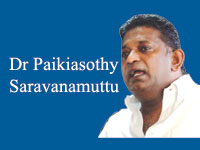Reply To:
Name - Reply Comment
Last Updated : 2024-04-19 19:28:00
 Dr Paikiasothy Saravanamuttu
Dr Paikiasothy Saravanamuttu.jpg)
.jpg) That substantive progress on this front is a national priority, nevertheless, is surely beyond dispute.
That substantive progress on this front is a national priority, nevertheless, is surely beyond dispute..jpg)
.jpg) As for his hardline allies, given the importance of the issue, can he not tell them to put up and shut up or get out?
As for his hardline allies, given the importance of the issue, can he not tell them to put up and shut up or get out?.jpg)
nkulanthaivelu Friday, 25 May 2012 05:14 AM
A very good analysis.

Add comment
Comments will be edited (grammar, spelling and slang) and authorized at the discretion of Daily Mirror online. The website also has the right not to publish selected comments.
Reply To:
Name - Reply Comment
On March 26, a couple arriving from Thailand was arrested with 88 live animal
According to villagers from Naula-Moragolla out of 105 families 80 can afford
Is the situation in Sri Lanka so grim that locals harbour hope that they coul
A recent post on social media revealed that three purple-faced langurs near t